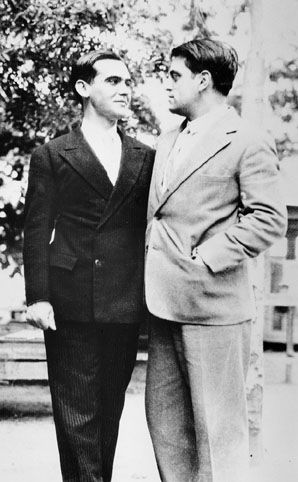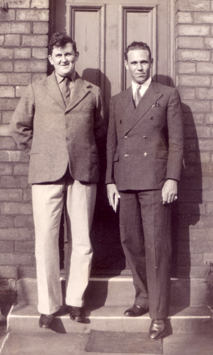Queer Places:
Prosper Cemetery, Woodstock, VT 05091
 Philip
Harry Cummings (1906-1991) was a world traveler, teacher of Modern Languages,
and paid lecturer and news analyst. He was born and grew up in Hardwick,
Vermont. He received a B.A. in Modern Languages from Rollins College in 1929,
and an M.A. in Spanish from Middlebury College, 1932. He began but did not
complete a Ph.D. at the University of North Carolina at Chapel Hill. One
article from his research there was published in the professional journal
Hispania.[1]
Philip
Harry Cummings (1906-1991) was a world traveler, teacher of Modern Languages,
and paid lecturer and news analyst. He was born and grew up in Hardwick,
Vermont. He received a B.A. in Modern Languages from Rollins College in 1929,
and an M.A. in Spanish from Middlebury College, 1932. He began but did not
complete a Ph.D. at the University of North Carolina at Chapel Hill. One
article from his research there was published in the professional journal
Hispania.[1]
Cummings was a great traveler and made sixteen transatlantic crossings
between ages 19 and 29.[2]
He is remembered as a remarkable (positive) character, the sort of man you
never forget.[3]
Cummings sometimes wrote to important people, including the eminent Spanish
scholar Miguel de Unamuno, "cold" and was able to meet them. He was introduced
to Alfonso XIII, King of Spain at court and got to know the Spanish Royal
Family and the Duke of Alba.
One of the most important episodes in Cummings's life was the ten days he
spent with his friend and lover, Spanish poet and playwright
Federico García Lorca, in August 1929. The two met in Madrid in 1928 and
spent another brief time together when Lorca was en route to New York in June
1929. At the conclusion of the Columbia University summer session of 1929,
Lorca went by train to Burlington, Vermont, and from there to the Cummings
family's summer rental cottage in Eden Mills, Vermont.[4]
During that visit, Cummings translated Lorca's book Canciones (Songs)
into English, with Lorca's advice on key points. This is the only translation
of Lorca's work into any language in which he is known to have participated.[5]
During this period, Lorca also wrote several poems that became part of his
book Poeta en Nueva York.[6]
Cummings and Lorca renewed their friendship in the fall of 1930 when
Cummings returned to Madrid on a IIE fellowship. He returned to the United
States abruptly the following spring on the advice of his IIE sponsors, just
before Alfonso XIII left the throne. There is no evidence that Cummings ever
saw Lorca again, although they may have continued to exchange letters.

With Edward Tempest
Though he carefully hid his own homosexuality,
Cummings longed to reveal the sexual component of his youthful friendship with
Lorca to other Lorca scholars. He came close to telling researchers Kessel
Schwartz in 1955, Daniel Eisenberg in 1975, and Ian Gibson in 1985, but never
allowed himself to go beyond veiled innuendo. In 1984, when Leslie Stainton
asked Cummings if he had ever known Lorca to have a girlfriend, he paused,
then casually replied, "Of course, some people have said that Lorca was
homosexual, but I wouldn't know anything about that."
In the end, he told only one person, the Spanish
poet Dionisio Cañas, about the
true extent of his relationship with Lorca. Cañas first visited Cummings in
November 1985 and returned for a longer stay in February 1986. At that point
the 79-year-old Cummings had been widowed for two years and was in poor
health, so he had little to lose by telling the truth.
Cummings claimed to have destroyed an autobiographical manuscript that
Lorca left with him in 1929, but there is no independent evidence that the
manuscript ever existed, and Cummings is far from a reliable source.[7]
In the midst of the Great Depression, Cummings was happy to get a job
teaching Spanish, French, and German at the Valley Ranch School for Boys in
Cody, Wyoming. He kept a detailed diary of his first year there. One portion,
dealing with a school holiday visit to the South Dakota capital, Pierre, has
been published,[8]
and the rest is being prepared for publication. The school closed in 1934.
Starting in 1938, Cummings began a new career as a paid lecturer and news
analyst. He was represented by various agencies; in the 1950s he was
represented by the W. Colston Leigh agency of New York, Washington, and San
Francisco, where he joined a roster of speakers that included such famous
names as David Brinkley, Vance Packard, and
Eleanor
Roosevelt. Cummings's appeal as a lecturer was reflected in his billing as
the agency's top repeat speaker on world affairs.[9]
He made his home for many years in Woodstock, Vermont.
My published books:


BACK TO HOME PAGE

- https://en.wikipedia.org/wiki/Philip_Cummings
 Philip
Harry Cummings (1906-1991) was a world traveler, teacher of Modern Languages,
and paid lecturer and news analyst. He was born and grew up in Hardwick,
Vermont. He received a B.A. in Modern Languages from Rollins College in 1929,
and an M.A. in Spanish from Middlebury College, 1932. He began but did not
complete a Ph.D. at the University of North Carolina at Chapel Hill. One
article from his research there was published in the professional journal
Hispania.[1]
Philip
Harry Cummings (1906-1991) was a world traveler, teacher of Modern Languages,
and paid lecturer and news analyst. He was born and grew up in Hardwick,
Vermont. He received a B.A. in Modern Languages from Rollins College in 1929,
and an M.A. in Spanish from Middlebury College, 1932. He began but did not
complete a Ph.D. at the University of North Carolina at Chapel Hill. One
article from his research there was published in the professional journal
Hispania.[1]


